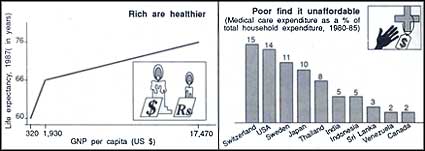
Bay watch!
A SATELLITE picture of the Earth, taken at night, would show a steady stream of light along the world's coastlines. Half the world's population - about 3.2 billion people - live and work within

A SATELLITE picture of the Earth, taken at night, would show a steady stream of light along the world's coastlines. Half the world's population - about 3.2 billion people - live and work within
A proposed new law threatens to abandon farmers to the tender mercies of seed corporations

Developing nations should get more actively involved with international politics on climate change. They should propose and direct negotiations, rather than just react and respond

The Kyoto Protocol could save the industralised North from taking action to reduce its own emissions. A cheaper and easier option is available to them: striking a deal with the poorer South

A drug that has been around for years is now being considered as a possible weapon against breast cancer

Using that mobile phone might boost your business, but it might fry your brain
Gujarat legislators want ONGC to rehabilitate farmers
Forgotten but not gone, the waste from more than 100 nuclear reactors that the federal government was supposed to start accepting for burial 10 years ago is still at the reactor sites, at least 20 years behind schedule. But it is making itself felt in the federal budget. With court orders and settlements, the federal government has already paid the utilities $342 million, but is virtually certain to pay a total of at least $7 billion in the next few years and probably over $11 billion, government officials said. The industry said the total could reach $35 billion. The payments come from an obscure and poorly understood government account that requires no new Congressional appropriations, and will balloon in size, experts said. The payments are due because the reactor owners were all required to sign contracts with the Energy Department in the early 1980s, with the government promising to dispose of the waste for a fee of a 10th of a cent per kilowatt-hour. It was supposed to begin taking away the fuel in the then far-off year of 1998. Since then, the utilities have filed 60 lawsuits. The main argument
The 5% reduction in freight rates for motor fuels announced in the Railway Budget is aimed at weaning away petrol and diesel traffic from road transport but will not result in any reduction in pump prices as the oil companies will save a mere Rs 50 crore annually due to the low volumes moved through rail. The new rate will bring down the cost of moving petrol and diesel over a distance of 100 km to Rs 172.40 per tonne from Rs 181. The rate for moving motor fuels over 1,000 km would cost Rs 1,184.40 a tonne against Rs 1,243.60. For a distance of over 2,000 km, the cost would come down to Rs 2,131.80 per tonne from Rs 2,238.40. The oil companies move less than 40% of the petrol and diesel consumed in the country by rail. The price build-up of petrol and diesel factors is a notional 50% of the prevailing rail freight. The 5% cut in rail freight will therefore not have an impact on the price build-up as the new freight charge would continue to be higher than what is accounted for in the price build-up. Following this 5% cut in freight on the two auto fuels, the railways hope to wean the petroleum cargo transport business away from roads. Oil firms move over 40% of the annual consumption of petrol and diesel through pipelines, the cheapest mode, and 20% by road.

A COUNTRY'S economic strength influences its health level, which, in turn, is correlated with its average income level. When the economy grows, the people's health should also improve. The gross

India looks to open agriculture to US corporates

The Zambian government's attempt to increase earnings from its rich copper deposits by raising mineral taxes to global standards is facing stiff resistance from foreign mine owners operating in the

THE people of the Uttar Pradesh hills have always strongly opposed attempts to snatch their traditional rights. Today, they are asserting themselves once again. At various seminars and meetings

A significant provision for forests in this year's Union budget may turn out to be a case of missing the forest for the trees. Motivated by a desire to "protect the environment and to save wood,"

Basic services can work against poverty but are usually elusive, shows the latest World Development Report

An interim report on the uk's land-use planning was released on July 4, 2006, fuelling a debate on the possibility of relaxing regulations in the planning system to encourage rapid market growth.
Sri Lanka has raised taxes on a range of goods and services to meet its war expenses. Coming ahead the country's budget due in early November, the move is a stopgap measure to raise around Sri Lankan Rs 10 billion (US $88 million) to finance the country's renewed war against the Liberation Tigers of Tamil Elam (LTTE) and to stabilise its economy.<br>
'Species 2000' is the latest UN/World Bank venture to take an integrated look at the world's biodiversity. The current tally puts the total number of plants, animals, fungi and

US Mission in Iraq The fear of worsening economic crisis has the Americans agonising over the costs of a long-drawn engagement in Iraq. There is increasing pessimism about the us's "mission'
Hailed till recently as a model of efficiency and productivity, the United Nations Children's Fund (UNICEF) is reeling under a barrage of criticism today. A UN-commissioned review of its operations